Hard work, team work and perseverance
As a friend and mentor to the Les Amis junior cycling team, Olympian and Tour de France stage winner...
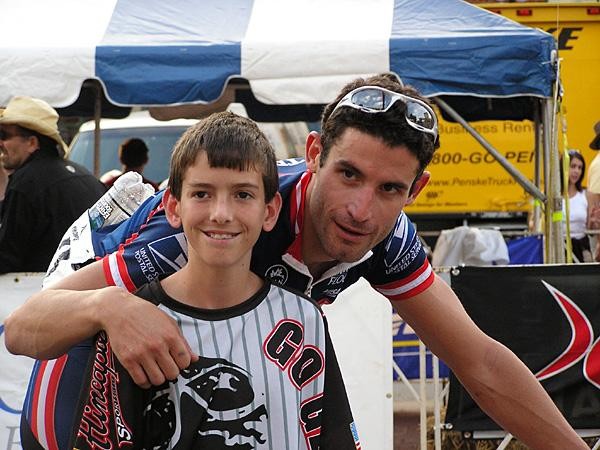
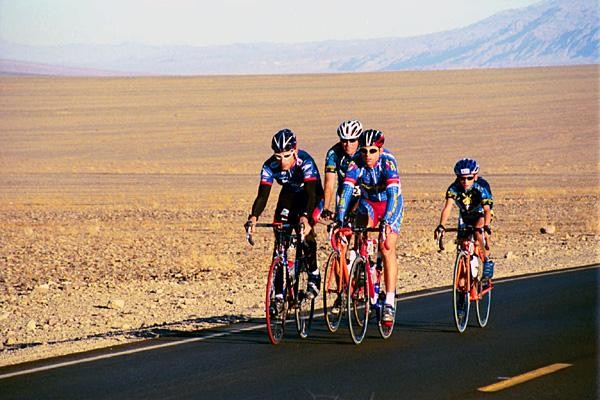
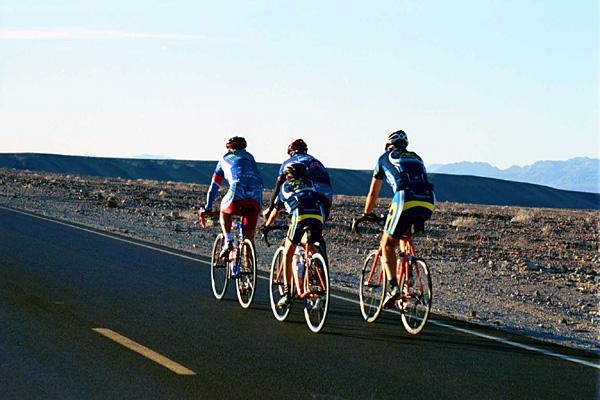
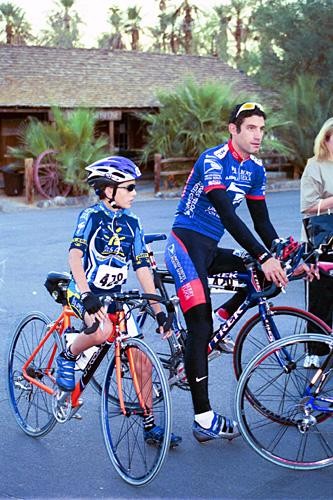
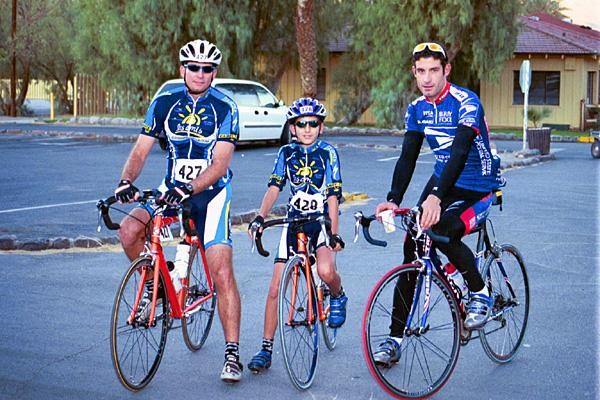
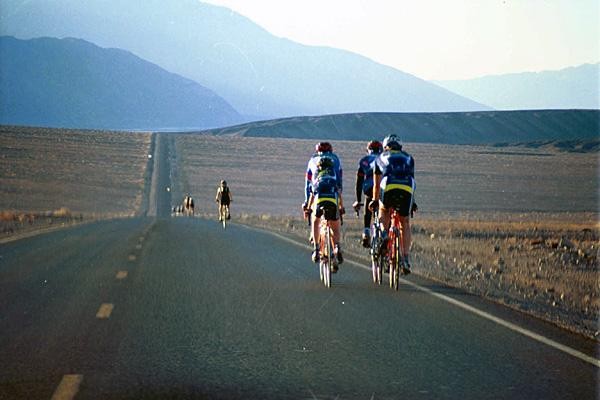




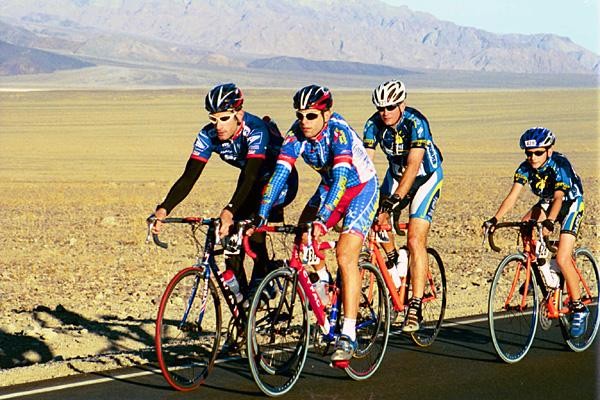

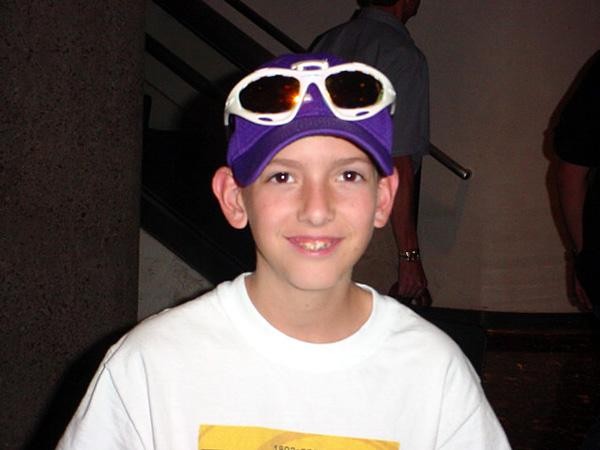
Tales from the Peloton, September 22, 2005
George Hincapie's life lessons to Les Amis juniors
As a friend and mentor to the Les Amis junior cycling team, Olympian and Tour de France stage winner George Hincapie inspires young riders with the motivation to train and provides a valuable example of self-sacrifice and hard work to South Carolina's next generation of cyclists.
"Last January I was out riding and freezing. I was getting ready to climb a local mountain and as I made the turn onto the mountain road, George came gliding down. We exchanged nods and waves," says Zack Baker, a 17-year-old junior racer who aspires to the pro ranks. "All the way up the road, I couldn't believe that on my ride in the middle of January, George Hincapie was out there on my little mountain. Seeing George out there on the road does make me want to ride that extra few miles and push myself!"
"I think one of the biggest ways George has influenced me is the fact that he's just an all-round great rider, no matter what I'm doing - sprinting, climbing or time trialing - I can always picture George doing the same thing," he says.
"I would have to consider George a great role model because he has worked so hard and doesn't get recognised on a big scale like Lance," says Eric Cash, another 17-year-old Les Amis rider. "I mean, he wins races, but you don't always hear about it. His work ethic is great and it shows with good hard work, you can come out on top." At home in Greenville, George and his brother Rich go above and beyond the call to support junior racing, providing uniforms for the hard-to-fit youngsters and even going with them on training rides.
"George isn't afraid to ride with us," says 14-year-old Stradford Helms, who adds that Hincapie often joins the juniors and other riders on local training rides when he's in town. And Strad, who is a juvenile diabetic, is just one young cyclist whose life was changed at a critical stage after a ride with Hincapie. Strad was new to cycling in 2003, when the US Postal rider and his brother Rich agreed to meet him in California, where they all rode the Death Valley Century together. Though the event was shortened to 50 miles due to extreme temperatures, the Hincapies stayed with Strad for the entire ride, stopping with him at the rest stops and looking after his health.
Get The Leadout Newsletter
The latest race content, interviews, features, reviews and expert buying guides, direct to your inbox!
"We rode the 50 miles faster than I ever had ridden in my life. But I didn't say a word. George rode the whole way with me and even waited when I would stop to check my blood sugar and ask me if I was OK," says Helms. "At the finish line, he said 'Good ride' and handed me his Oakleys. They were the white glasses he wore in the Tour. That was so nice."
"When you meet famous people, sometimes you're afraid of what they will be like. George was the nicest person I've ever met. It was great to meet an athlete that is so famous and not be disappointed that they weren't what you thought they were." Two years later, Strad is not only still on the bike, but holds the state title for his age group in every discipline. According to his mother, Jennifer Helms, it's Hincapie's interest in Strad that has helped him beat the odds.
"People used to say that Strad can't cycle because he's diabetic. For George to be such a great cyclist and for him to think that Strad can ride, and the extra time he spends to make Strad think he can do it and be really good makes him think he can aachieve that too," she says. "George inspires him to think he doesn't have to limit his activities and interests. There's no reason for him to stop because he's diabetic."
Though some may say he has nothing to gain by befriending young novice racers, Hincapie finds the association is its own rich reward. "I love to see the enthusiasm in the junior riders. They really have that honest desire to excel," he says. "Maybe it's just fun to see a little bit of myself in some of the junior racers. Mainly, it's nice to see them having fun and striving to achieve their goals."
Hincapie, who is himself a product of American junior racing, is sensitive to the impact that racers like himself can have on young riders, and is glad to support what he sees as the future of cycling. "I came up through the junior ranks and I know what that (having a role model) can do for a rider. It's great to have positive role models in our sport and I'm happy to help when I can," he says.
"I do see how professionals like me can help influence younger riders. I remember what it was like to be a junior," he says. "I do think it's important for professional cyclists to encourage younger riders. If we're going to grow our sport, we have to bring more young people into it. We should all get involved in helping junior riders. That is the future of our sport."
Ultimately, however, it's not the big-name athletes that Hincapie credits with his own triumphs. Rather, it's his father Ricardo and brother Rich that he says have taught him the values of hard work and sacrifice that are fundamental to a successful and fulfilling cycling career.
"My father, Ricardo, has been my biggest role model on and off the bike. He was a pretty good rider himself when he was younger. He got me into the sport and I really looked up to him. My older brother, Rich, was a role model in the beginning as well," says Hincapie. "We are very close as a family and we rode together all the time. My father taught us what was right and wrong. He taught us to work hard and strive to achieve our goals. He was very inspiring for me. My father really taught me that if I work hard enough, I can achieve anything. I think that is important at any age."
"One of the reasons I work so hard today is because my father taught me to persevere. I don't think I would be where I am today without his positive influence," says Hincapie. Furthermore, Hincapie says his hallmark trait of being a team player comes from following the example set by his parents. "My father played a huge part in helping me understand the concept of sacrificing for the good of the team. Being part of a team can be a very special thing. Watching my parents sacrifice some in order to help my brother and me achieve our goals in cycling was very influential in this way. They helped us get bikes and equipment. They helped us get to races and really pursue our goals. Seeing their little sacrifices here and there really helped me understand the importance of the team concept," he says. "Because of that, I am very proud of my role on my team now. I'm proud of what we have achieved through our teamwork."
"People have to realise that I've been fortunate to be part of a team that let's me go after some race wins in the Spring classics. These are races that I love and I want to do well in. The team supports me in this way. During the Tour for the last seven years, we have been there for one reason and one reason only. Score the overall team victory. We rode for that one purpose. Many people don't realise the satisfaction that all of us felt by winning that race every year. It was incredibly satisfying. I was allowed to pursue my personal goals in the classics and I was 100 percent dedicated to doing my job in the Tour de France."
Now Hincapie's passing these lessons down to the youth of Greenville, who are discovering that there's no getting around hard work if they want success on the bike. "I work as hard as I can to achieve my goals. I have steadily improved year after year by working harder and training smarter over the long haul. The only way to get better is to work harder. This doesn't guarantee a win, but it sure does improve your chances," Hincapie says.
"I'm glad that the junior riders are understanding that things are not handed to you. You have to work for them. When you put in that work, the payoff can be huge. I trained really hard to do the best job I could in the Tour de France. I was fit enough to put myself in a winning position and it paid off for me. I'm glad that the junior riders are seeing my success is a result of hard work. That's definitely important for them to understand," he says.
For racers of any age who are struggling with discouragement or motivation, Hincapie's advice is much the same. "Hard work and dedication to your goals will pay off in the long run. There is no substitute for hard work and smart training." And though Hincapie will always be much admired for his work ethic and sportsmanship, it will always be his sincerity and friendliness that his junior friends most enjoy about him. "I am no one in cycling. Most people wouldn't take time with a kid that has an illness. They may do one nice thing for them, but he [Hincapie] continues to care and be my friend years later," says Stradford Helms. "I told him that one day his perfect day would come like the one he gave me in Death Valley and I am so happy his 'day' is finally coming. He deserves it more than anyone. I hope good things keep coming his way for a very long time."